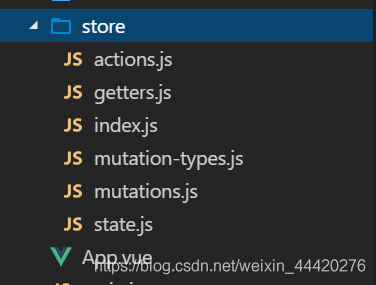axios封装
我之前是这样写法,如果有params,query参数字段的话字符串拼接。但看网上的有人说不建议放在Vue原型
import axios from 'axios' Vue.prototype.$ajax= axios // 原型 this.$ajax.get('api/getNewsList') .then((response)=>{ this.newsList=response.data.data; }).catch((response)=>{ console.log(response); }) 这两天看大佬写Vuex+axios,大佬就是大佬
封装axios
/* ajax 请求函数模块 */ import axios from 'axios' /** * 向外部暴漏一个函数 ajax * @param {*} url 请求路径,默认为空 * @param {*} data 请求参数,默认为空对象 * @param {*} type 请求方法,默认为GET */ export default function ajax (url = '', data = {}, type = 'GET') { // 返回值 Promise对象 (异步返回的数据是response.data,而不是response) return new Promise(function (resolve, reject) { // (利用axios)异步执行ajax请求 let promise // 这个内部的promise用来保存axios的返回值(promise对象) if (type === 'GET') { // 准备 url query 参数数据 let dataStr = '' // 数据拼接字符串,将data连接到url Object.keys(data).forEach(key => { dataStr += key + '=' + data[key] + '&' }) if (dataStr !== '') { // 把最后的&去掉,拼成完整的url dataStr = dataStr.substring(0, dataStr.lastIndexOf('&')) url = url + '?' + dataStr } // 发送 get 请求 promise = axios.get(url) } else { // 发送 post 请求 promise = axios.post(url, data) } promise.then(response => { // 成功回调resolve() resolve(response.data) }) .catch(error => { // 失败回调reject() reject(error) }) }) } 使用的话
const BASE_URL = '/api' // 地址全写,但考虑跨域 / proxy 跨域设置 // params参数 export const reqAddress = geohash => ajax(`${BASE_URL}/position/${geohash}`) // query参数 export const reqSearchShop = (geohash, keyword) => ajax(BASE_URL + '/search_shops', {geohash, keyword}) Vuex模块化

index.js
/* vuex最核心的管理对象store 组装模块并导出 store 的地方 */ // 首先引入Vue及Vuex import Vue from 'vue' import Vuex from 'vuex' // 引入四个基本模块 import state from './state' import mutations from './mutations' import actions from './actions' import getters from './getters' // 一定要声明使用插件 Vue.use(Vuex) // 把 store 对象提供给 “store” 选项,这可以把 store 的实例注入所有的子组件 export default new Vuex.Store({ state, mutations, actions, getters }) 挂载Vue实例
使用的话this.$
import store from './store' new Vue({ el: '#app', components: { App }, template: '<App/>', // 为根组件加入路由 router, store }) state.js
export default { categorys: [], // 食品分类数组 goods: [], // 商品列表 info: {}, // 商家信息 } mutation-types.js
export const RECEIVE_CATEGORYS = 'receive_categorys' // 接收分类数组 export const RECEIVE_GOODS = 'receive_goods' // 接收商品数组 export const RECEIVE_INFO = 'receive_info' // 接收商家信息 mutations.js
/* vuex 的 mutations 模块 */ import Vue from 'vue' import { RECEIVE_CATEGORYS, RECEIVE_INFO, RECEIVE_GOODS} from './mutation-types' // [方法名](state,{param}){} export default { [RECEIVE_CATEGORYS] (state, {categorys}) { state.categorys = categorys }, [RECEIVE_INFO] (state, {info}) { state.info = info }, [RECEIVE_GOODS] (state, {goods}) { state.goods = goods } } actions.js
/* Action:通过操作mutation间接更新state的多个方法的对象 */ // 注意要引入api接口函数 import { reqCategorys, reqShopGoods, reqShopInfo, } from '../api' import { RECEIVE_CATEGORYS, RECEIVE_GOODS, RECEIVE_INFO} from './mutation-types' export default { // 异步获取食品分类列表 async getCategorys ({commit}) { // 发送异步ajax请求 const result = await reqCategorys() // 提交一个mutation if (result.code === 0) { const categorys = result.data commit(RECEIVE_CATEGORYS, {categorys}) } }, // 异步获取商家列表 async getShops ({commit, state}) { // 对象的结构赋值 const {longitude, latitude} = state // 发送异步ajax请求 const result = await reqShops(longitude, latitude) // 提交一个mutation if (result.code === 0) { const shops = result.data commit(RECEIVE_SHOPS, {shops}) } }, // 异步获取商家信息 async getShopInfo ({commit}) { const result = await reqShopInfo() if (result.code === 0) { const info = result.data commit(RECEIVE_INFO, {info}) } }, } getters.js
/* 包含多个基于state的getter计算属性的对象 */ export default { totalPrice (state) { return state.cartFoods.reduce((preTotal, food) => preTotal + food.count * food.price, 0) }, } 将数据放在Vuex中,在页面中调用。详情还是看官方文档。
// state computed: { ...mapState(['info', 'categorys', 'goods']), } // mutations 同步 // action 异步 提交mutations // 通过this.$store.dispatch 方法触发调用Action this.$store.dispatch('getAddress') // this.getAddress() this.getUserInfo() }, methods: { ...mapActions(['getUserInfo']) }